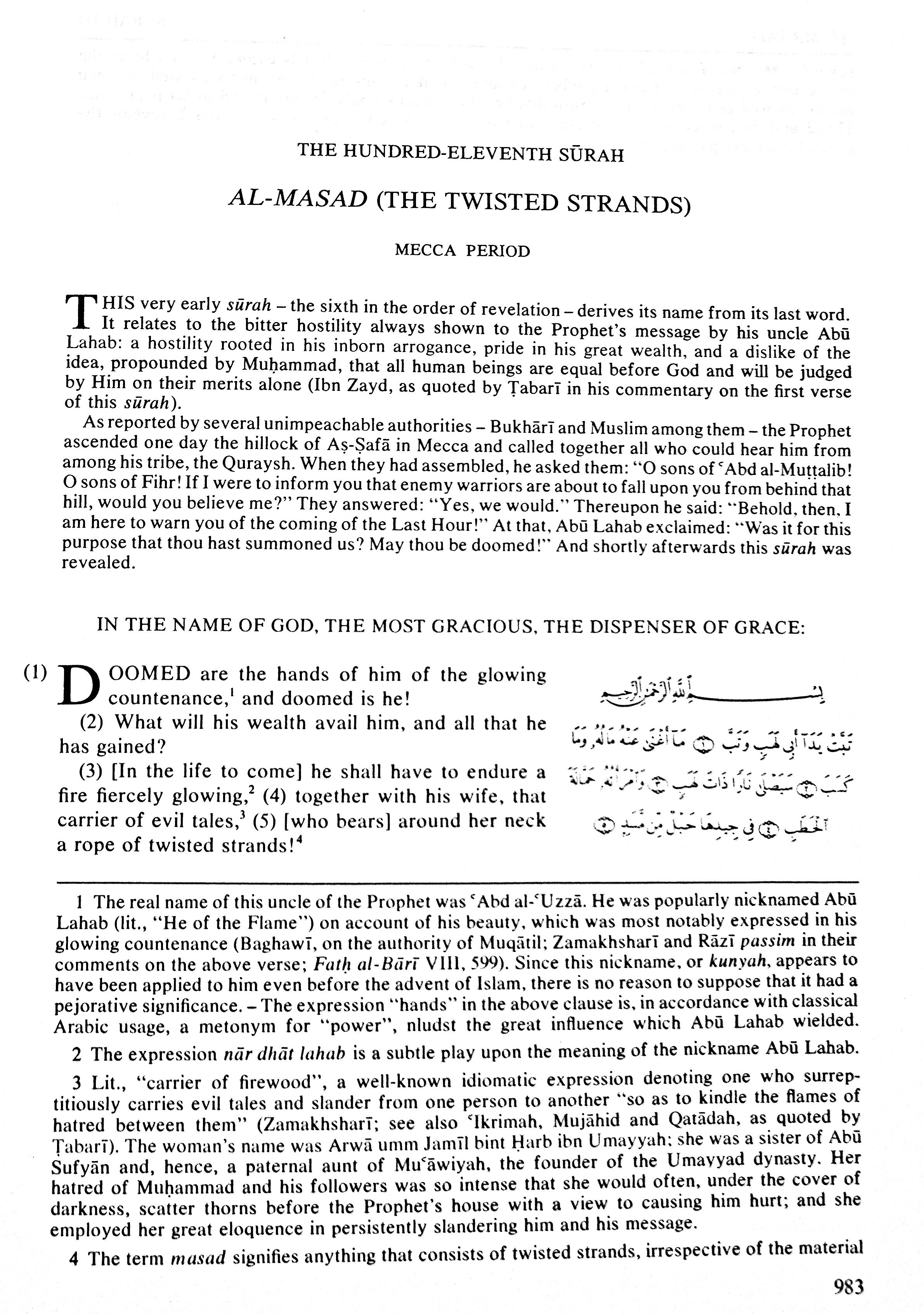Muhammad Asad, The Message of the Qur’ān; Translated and Explained by Muhammad Asad (1980)
Al-Masad (The Twisted Strands)
This very early sūrah – the sixth in the order of revelation – derives its name from its last word. It relates to the bitter hostility always shown to the Prophet’s message by his uncle Abū Lahab: a hostility rooted in his inborn arrogance, pride in his great wealth, and a dislike of the idea, propounded by Muḥammad, that all human beings are equal before God and will be judged by Him on their merits alone (Ibn Zayd, as quoted by Ṭabarī in his commentary on the first verse of this sūrah).
As reported by several unimpeachable authorities – Bukhārī and Muslim among them – the Prophet ascended one day the hillock of Aṣ-Ṣafā in Mecca and called together all who could hear him from among his tribe, the Quraysh. When they had assembled, he asked them: “O sons of ʿAbd al-Muṭṭalib! O sons of Fihr! If I were to inform you that enemy warriors are about to fall upon you from behind that hill, would you believe me?” They answered: “Yes, we would.” Thereupon he said: "Behold, then. I am here to warn you of the coming of the Last Hour!” At that, Abū Lahab exclaimed: “Was it for this purpose that thou hast summoned us? May thou be doomed!” And shortly afterwards this sūrah was revealed.
(1) Doomed are the hands of him of the glowing countenance,1 and doomed is he!
(2) What will his wealth avail him, and all that he has gained?
(3) [In the life to come] he shall have to endure a fire fiercely glowing,2
(4) together with his wife, that carrier of evil tales,3
(5) [who bears] around her neck a rope of twisted strands!4
1 The real name of this uncle of the Prophet was ʿAbd al-ʿUzzā. He was popularly nicknamed Abū Lahab (lit., “He of the Flame”) on account of his beauty, which was most notably expressed in his glowing countenance (Baghawī, on the authority of Muqātil; Zamakhsharī and Rāzī passim in their comments on the above verse; _Fatḥ al-Bārī VIII, 599). Since this nickname, or kunyah, appears to have been applied to him even before the advent of Islam, there is no reason to suppose that it had a pejorative significance. – The expression “hands” in the above clause is, in accordance with classical Arabic usage, a metonym for “power”, nludst the great influence which Abū Lahab wielded.
2 The expression nār dhāt lahab is a subtle play upon the meaning of the nickname Abū Lahab.
3 Lit., “carrier of firewood”, a well-known idiomatic expression denoting one who surreptitiously carries evil tales and slander from one person to another “so as to kindle the flames of hatred between them” (Zamakhsharī; see also ʿIkrimah, Mujāhid and Qatādah, as quoted by Ṭabarī). The woman’s name was Arwā umm Jamīl bint Ḥarb ibn Umayyah; she was a sister of Abū Sufyān and, hence, a paternal aunt of Muʿāwiyah, the founder of the Umayyad dynasty. Her hatred of Muḥammad and his followers was so intense that she would often, under the cover of darkness, scatter thorns before the Prophet’s house with a view to causing him hurt; and she employed her great eloquence in persistently slandering him and his message.
4 The term masad signifies anything that consists of twisted strands, irrespective of the material
